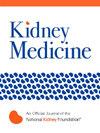Patient and Stakeholder Collaborative Research: Development of a Community Advisory Board for Nephrology and Transplantation Studies
IF 3.4
Q1 UROLOGY & NEPHROLOGY
引用次数: 0
Abstract
Community input enhances the impact of research. Yet, there are challenges when eliciting community perspectives in nephrology/transplant research: recruitment of patients across a wide spectrum of familiarity with kidney disease; a lack of trust from marginalized patients because of health care barriers, institutionalized structural racism, and historical harm; and retention of members facing high burden of care. To address these challenges, we drafted a mission and formed a community advisory board to provide input on nephrology/transplant research. We worked with kidney disease community organizations that prioritize diversity and equity to recruit members with chronic kidney disease, end-stage kidney disease, or a kidney transplant, as well as nephrology/transplant caregivers and kidney donors. We formed a diverse group of 9 members and received feedback on 5 research proposals over 4 quarterly meetings, bridging a communication gap between community perspectives and researchers. The collaborative environment stimulated feedback that improved our nephrology/transplant research to reflect the perspectives of those most affected by research findings. Eight members have remained active for more than 1 year. In this collaborative paper, we describe our process of forming a nephrology/transplant community advisory board, and participants highlight the benefits of sharing their lived experiences to improve and amplify the impact of nephrology/transplant research.
患者和利益相关者合作研究:肾脏病和移植研究社区咨询委员会的发展
社区的投入增强了研究的影响。然而,在肾病学/移植研究中,激发社区观点存在挑战:招募对肾脏疾病熟悉程度广泛的患者;由于卫生保健障碍、制度化的结构性种族主义和历史伤害,边缘化患者缺乏信任;以及保留面临高额护理负担的成员。为了应对这些挑战,我们起草了一份使命,并成立了一个社区咨询委员会,为肾脏学/移植研究提供意见。我们与肾病社区组织合作,优先考虑多样性和公平性,以招募患有慢性肾病、终末期肾病或肾脏移植的成员,以及肾脏学/移植护理人员和肾脏捐赠者。我们组成了一个由9名成员组成的多元化小组,并在4次季度会议上收到了5项研究建议的反馈,弥合了社区观点和研究人员之间的沟通差距。协作环境激发了反馈,改善了我们的肾脏病/移植研究,以反映受研究结果影响最大的人的观点。有8名成员至今仍活跃超过1年。在这篇合作论文中,我们描述了我们组建肾脏学/移植社区顾问委员会的过程,参与者强调了分享他们的生活经验对改善和扩大肾脏学/移植研究的影响的好处。
本文章由计算机程序翻译,如有差异,请以英文原文为准。
求助全文
约1分钟内获得全文
求助全文

 求助内容:
求助内容: 应助结果提醒方式:
应助结果提醒方式:


